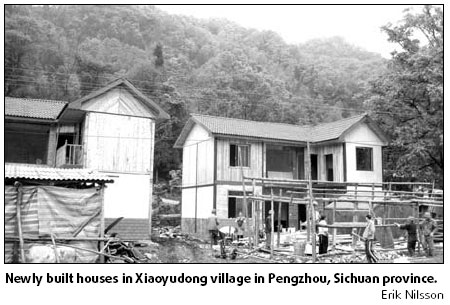New homes, new hopes rise amid scattered tombstones

As Yang Zaishang tends a small plot of vegetables in Sichuan province's Xiaoyudong village, she steals an occasional glance at the new seven-room house her family just moved into.
"These houses are so much better than the ones we lived in that were destroyed in the earthquake," the 72-year-old says.
"I'm so thankful to the government and overseas donors for their contributions."
Sichuan University designed the Western-styled homes to withstand 8.0-magnitude quakes. They are much larger and more modern than most dwellings in rural China.
Every family will have to pay 10,000 yuan for their house. The central government has provided a 40,000-yuan subsidy complemented by an 8,000-yuan subsidy from Fujian's provincial government, which was assigned to assist Pengzhou after the May 12 earthquake. The rest came from overseas donors, village Party Secretary Wang Gang says.
But even with most of the houses paid for, Yang says she and her family of five - her husband, who works outside of Sichuan, daughter, daughter-in-law and grandson - still struggle.
"We have financial problems, because all of our furniture and appliances were destroyed in the quake, so we have to buy new ones," Yang says.
"We're recovering step-by-step, but it will still take time."
Yang joined the first batch of 460 people to move into the houses this month, while the rest of Xiaoyudong's 1,300 residents will move in during two more phases before year end, village Party Secretary Wang Gang says.
"Our greatest challenge after the quake has been rebuilding our village," he says.
Wang says 10 of the settlement's 380 houses withstood the disaster. Eleven residents died and 20 were injured when their houses collapsed.
Flags rise from mounds of stone on the nearby roadsides - quake victims' graves. Wang says families who lost members in the disaster could send their children to study for free in Fujian.
Reconstruction has provided jobs for Xiaoyudong's residents, and 35 percent of its construction workers are local. But more than 40 percent of the working-aged have left the village for cities since last May, Wang says.
Fujian and Sichuan's provincial capital Chengdu provided job training and preferential hiring for Pengzhou's residents, Wang adds.
The quake has also led to the reclamation of farmland that was devastated by landslides before the disaster or abandoned as residents took jobs in cities, Wang explains.
Yang says landslides caused by the quake buried about 15 percent of her family's cropland.
The central government had provided 10 yuan and half a kg of rice for every resident until November, Wang says. "But now, most residents can raise crops for themselves," he adds.
Yang says it is not easy to cook at their temporary housing complex, so the family has often returned to their crumpled farmhouse to prepare meals since last May.
Xiaoyudong and Baishuihe villages were the areas of Pengzhou most devastated by the quake, local residents say. Nearly a year after the disaster, few signs of its destructive force can be seen in downtown Pengzhou.
Phalanxes of construction vehicles grumble along the roads leading from the city toward its rural settlements. Many of these roadways are still being repaired, and most are flanked with rubble and reconstruction.
Between downtown Pengzhou and Xiaoyudong, new buildings are taking shape inside green burlap cocoons. Construction of the new Baima middle school, Jingmaoyuan retirement home and Xingxing hospital - all projects supported by Fujian's provincial government - are nearly finished.
Workers are disassembling the Xingxing temporary housing complex in Yangping village, as many residents have already moved into new homes. Still, some of the complex's houses remain occupied.
The tents and makeshift hovels that had served as quake survivors' dwellings have by now been either abandoned or are being used as spaces for small businesses. Some are packed with people playing mahjong and sipping tea.
In Huang village, a family of five - Luo Yuanjun, her husband, her parents and her son - are building their new home across the street from their collapsed farmhouse.
The government provided 40,000 yuan for their 90-sq-m house, while they will have to pay off the difference of about 25,000 yuan.
"Our temporary house is really hot in the summer and is too small for our whole family, so some of us are living here now," Luo says.
"We can't wait to move in. This new house is so much better than our old one."
Because Luo's husband works as a mine manager in Yunnan province, he was not counted in the government subsidy.
"We rely on his income and the small amount we earn from crops, but it's not enough," Luo says.
"We have to find another way to make more money to pay off our part of this house's cost. But I have to stay home to take care of my parents, so I don't have any way to make money."
In addition, the family had to take out a government loan to buy new furniture and appliances, because rain destroyed theirs in the days following the quake, Luo says. She smiles as she points to a new television set sitting in their driveway.
"Mostly, we're happy our family is safe," Luo says.
(China Daily 05/18/2009 page8)














